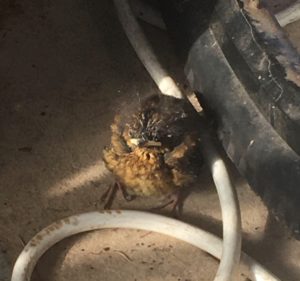
A few weeks into the lockdown we ended up caring for a robin fledgling, who we named ‘Tufty’. For a little ball of fluff, he ate rather a lot (hourly meal worm feeds) and produced plenty of waste but he eventually flew the human nest. We only had Tufty for about 72 hours however the little fella was full of grit and determination. I think us humans can learn a great deal from nature especially about the skill of resilience.
Psychology Today describes resilience as “the ineffable quality that allows some people to be knocked down by life and come back stronger than ever. Rather than letting failure overcome them and drain their resolve, they find a way to rise from the ashes.” In a nutshell, resilience can be defined as the ability – and tendency – to “bounce back.” So why does resilience matter? Well, to start with, it is highly unlikely that work and life in general will go back to how it was before COVID. Our workplaces are likely to change and with it the skills organisations require. We don’t fully know the economic impact of COVID-19 and one can assume that in finding your first graduate job, the road might be a little bumpy. Being resilient means embracing these ups and downs whilst staying focused on your long-term goal. A few weeks ago I wrote a blog post on job hunting tips during a pandemic which might be worth a read. If you want to learn more about resilience and how to develop this valuable skill tune into this podcast by the Squiggly Career.
That said, the world of work was being disrupted pre-COVID and the pandemic in many ways has accelerated the pace of change, but the change was inevitable. Take for example, the transition to virtual work which happened overnight has also exposed the inequalities in digital capabilities across the UK workforce. So, as you fledge from University into this new and uncertain world of work what additional skills will you need to thrive?
- Active learning and growth mindset: According to the World Economic Forum, in just five years 35% of the skills deemed essential today will change. One sure way to remain relevant in the world of work is to commit to lifelong learning. I am a huge fan of Carol Dweck’s insightful book, Mindset: The New Psychology of Success. (Check out her TED talk). In her book, she advocates for a type of mindset that is all about being open to learning new things, valuing feedback and embracing change. Let’s put this into context, for those of you graduating in 2020 your career is likely to span 30-40 years. The skills and knowledge you have right now will evolve over the course of your working life as will your values and personal priorities. Therefore, focus on being commercially aware, stay on top of market trends and keep adding to your skillset.
- Emotional intelligence (EQ): is the ability to interact effectively with other humans and at its core, it’s about whether you can lead through empathy, influence, and collaboration. Remote working means human interaction is reduced which in turn can impact how we communicate, build trust and forge relationships. EQ is an essential skill when working in remote and distributed teams. According to the team behind Berkley’s MOOC on Empathy and Emotional Intelligence at work, our wellbeing is entwined with our social interactions, therefore EQ in the workplace is essential to positive mental health.
- Purpose: the Japanese concept of Ikigai means, ‘a reason for being’ and can also be translated to, ‘the reason why I get up in the morning’. According to Hector Garcia, the co-author of Ikigai: The
 Japanese Secret to Long and Happy Life: “your ikigai is at the intersection of what you are good at and what you love doing”. Perhaps the COVID-19 situation affords a rare opportunity to press pause and reflect on what matters to you. The idea being that if you find your purpose then you're on your way to doing well in your career and finding fulfilment. Consider these questions:
Japanese Secret to Long and Happy Life: “your ikigai is at the intersection of what you are good at and what you love doing”. Perhaps the COVID-19 situation affords a rare opportunity to press pause and reflect on what matters to you. The idea being that if you find your purpose then you're on your way to doing well in your career and finding fulfilment. Consider these questions:
- What am I good at?
- What do I love?
- What does the world need?
- What can I be paid for?
I often find myself wondering how little Tufty is doing. I'd like to think he's out there exploring the big wide world. There's a lot to be said about how he believed in himself to take off and fly. So at the very least, trust yourself and have faith in your ability.
We are here for you in Careers so do get in touch 🙂
Respond
